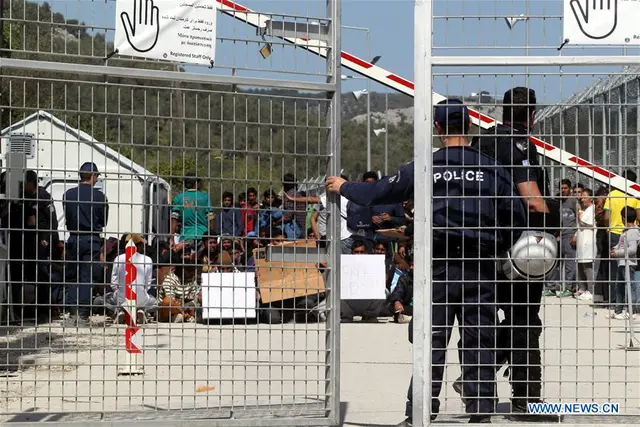Tensions flared across organized reception camps and makeshift tent cities in Greece on Wednesday, as thousands of refugees and migrants protested against readmissions to Turkey which started on Monday as part of the EU-Turkey agreement aiming to curb the influx into Europe.
A Pakistani migrant climbed on an electricity pillar threatening to commit suicide inside the Moria hotspot on Lesvos island on Wednesday, Greek national broadcaster ERT reported.
The man was saved with the intervention of Greek police officers, other refugees and migrants and volunteers of NGOs.
The incident happened as hundreds of people among the 3,000 detainees at Moria, as well as thousands across Greece were continuing sit-in protests against the EU-Turkey deal and deportations.
On Chios island, about 300 refugees and migrants who broke out of a reception center last week staged similar protest across half the island's main port, obstructing the docking of ships. On Tuesday night, vessels were docking in Mestos' port, 30 km from the capital of Chios.
At Piraeus port, Greece's largest port, tensions were also running high on Wednesday, as the 4,500 people camping out across the port since early March, refused to leave the passengers' terminals for organized accommodation centers.
Protesters complained to Greek officials who visited the site that conditions at organized centers were not good and chanted slogans for the opening of the borders.
One man threatened to throw a baby at the police forces, Greek national news agency AMNA reported. The baby was returned to his mother a few minutes later.
Since mid-February, more than 53,000 people have been stranded in Greece, according to the latest official figures released on Wednesday from the government, after the gradual border shutdown across the Balkan route to central Europe.
More than one million refugees and migrants have crossed through Greece from Turkey and reached central and northern Europe since the beginning of 2015.
Under the recent EU-Turkey deal, all migrants entering Greece after March 20 and not making an asylum request there will be readmitted to Turkey.
The measure concerns some 6,000 people so far. Most of them have put forth asylum bids this week, according to the Greek authorities, to delay their return, while dozens of new arrivals are recorded.
In northern Greece some 12,000 refugees and migrants remained at the tent city near the crossing at the borders with the Former Yugoslav Republic of Macedonia (FYROM).
For a third week, dozens of refugees held a sit-in protest on the railway track blocking train transports, while others protested on Wednesday on the national highway connecting Idomeni to Thessaloniki city a few kilometers away, AMNA reported.
The implementation of the swap deal on refugees between Turkey and the EU kicked off on Monday, with dozens of Syrian resettling in Europe in exchange for repatriating some others to Turkey.
The deal was agreed on March 18 in a summit between Turkish and European leaders to regulate migration flow from conflict and poverty areas to Europe via Turkey. The goal is to stop or at least reduce irregular migrants who arrived by illegal means, and to encourage legal settlements.
Over 200 migrants, mostly Pakistani and Bangladeshi nationals, were transferred on three boats from Greek islands in the Aegean to Turkey's western province Izmir on Monday.
According to the initial schedule, some 700 refugees would be escorted to Turkey by European border control agency Frontex officers until April 7.
The Greek side has not yet specified when the next returns will take place.
AMNA reported on Tuesday citing Turkish sources that a second batch of people may be returned to Turkey on Friday. Enditem
 简体中文
简体中文

